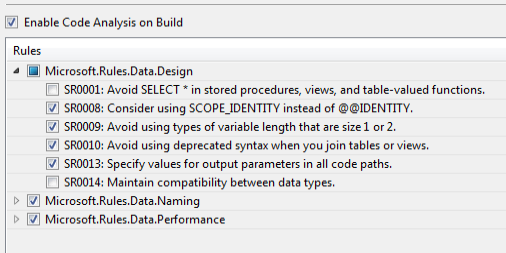I have many temporal tables in my SQL Server database project. Today I upgrade my SSDT to the latest version and I got the following errors for temporal tables when building the project. For example, I have a temporal table UseCase which has a history table called UseCase_HISTORY.
It looks like a code analysis problem. If I disable the code analysis on build, there will be no errors on build.
I am using VS2015 and VS2017. Both have the same problems.
C:\Program Files (x86)\Microsoft Visual Studio\2017\Enterprise\MSBuild\Microsoft\VisualStudio\v15.0\SSDT\Microsoft.Data.Tools.Schema.SqlTasks.targets(1292,5): Error: SQL72039: The substring is out of the bounds for script MSSQL::dbo.UseCase_HISTORY.
C:\Program Files (x86)\Microsoft Visual Studio\2017\Enterprise\MSBuild\Microsoft\VisualStudio\v15.0\SSDT\Microsoft.Data.Tools.Schema.SqlTasks.targets(1292,5): Error: MSB4018: The "SqlStaticCodeAnalysisTask" task failed unexpectedly.
Microsoft.Data.Tools.Schema.SchemaModel.ScriptCacheException: The substring is out of the bounds for script MSSQL::dbo.UseCase_HISTORY.
at Microsoft.Data.Tools.Schema.SchemaModel.ScriptCache.CheckAndGetSubstring(String cacheIdentifier, Int32 startOffset, Int32 length, CachedString value)
at Microsoft.Data.Tools.Schema.SchemaModel.ScriptCache.GetScript(String cacheIdentifier, Int32 startOffset, Int32 length)
at Microsoft.Data.Tools.Schema.Sql.SchemaModel.SqlSourceInformation.ParseSource()
at Microsoft.Data.Tools.Schema.Sql.SchemaModel.SqlSourceInformation.get_ScriptDom()
at Microsoft.SqlServer.Dac.Model.SqlSchemaModelObjectService.GetOriginalSourceFragment(TSqlObject tSqlObject)
at Microsoft.SqlServer.Dac.TSqlModelUtils.TryGetFragmentForAnalysis(TSqlObject tSqlObject, TSqlFragment& fragment)
at Microsoft.SqlServer.Dac.CodeAnalysis.SqlRuleExecutionContext.get_ScriptFragment()
at Microsoft.SqlServer.Dac.CodeAnalysis.Rules.Design.DataTypeCompatibilityRule.Analyze(SqlRuleExecutionContext context)
at Microsoft.SqlServer.Dac.CodeAnalysis.Engine.RuleEngine.TryExecuteSingleRule(RuleDescriptor ruleDescriptor, SqlRuleExecutionContext executionContext)
at Microsoft.SqlServer.Dac.CodeAnalysis.Engine.RuleEngine.ExecuteSingleRule(RuleDescriptor ruleDescriptor, SqlRuleExecutionContext executionContext, IList`1 errors)
at Microsoft.SqlServer.Dac.CodeAnalysis.Engine.RuleEngine.ExecuteRules(SqlRuleExecutionContext executionContext, IEnumerable`1 rules, IList`1 allErrors)
at Microsoft.SqlServer.Dac.CodeAnalysis.Engine.RuleEngine.ExecuteElementRules(TSqlModel schemaModel, List`1 allErrors, IEnumerable`1 modelElements, ISet`1 rules, List`1 allProblems)
at Microsoft.SqlServer.Dac.CodeAnalysis.Engine.RuleEngine.ExecuteElementRules(TSqlModel schemaModel, List`1 allErrors)
at Microsoft.SqlServer.Dac.CodeAnalysis.Engine.RuleEngine.ExecuteRules(TSqlModel schemaModel, IList`1& errors)
at Microsoft.SqlServer.Dac.CodeAnalysis.CodeAnalysisService.ExecuteProcessRulesStep()
at Microsoft.SqlServer.Dac.CodeAnalysis.CodeAnalysisService.ExecuteStep(Func`1 step)
at Microsoft.SqlServer.Dac.CodeAnalysis.CodeAnalysisService.Execute()
at Microsoft.SqlServer.Dac.CodeAnalysis.CodeAnalysisService.Analyze(TSqlModel model)
at Microsoft.Data.Tools.Schema.Tasks.Sql.SqlStaticCodeAnalysisTask.ExecuteProcessRulesStep()
at Microsoft.Data.Tools.Schema.Tasks.Sql.SqlStaticCodeAnalysisTask.ExecuteStep(Func`1 step)
at Microsoft.Data.Tools.Schema.Tasks.Sql.SqlStaticCodeAnalysisTask.Execute()
at Microsoft.Build.BackEnd.TaskExecutionHost.Microsoft.Build.BackEnd.ITaskExecutionHost.Execute()
at Microsoft.Build.BackEnd.TaskBuilder.<ExecuteInstantiatedTask>d__26.MoveNext()

